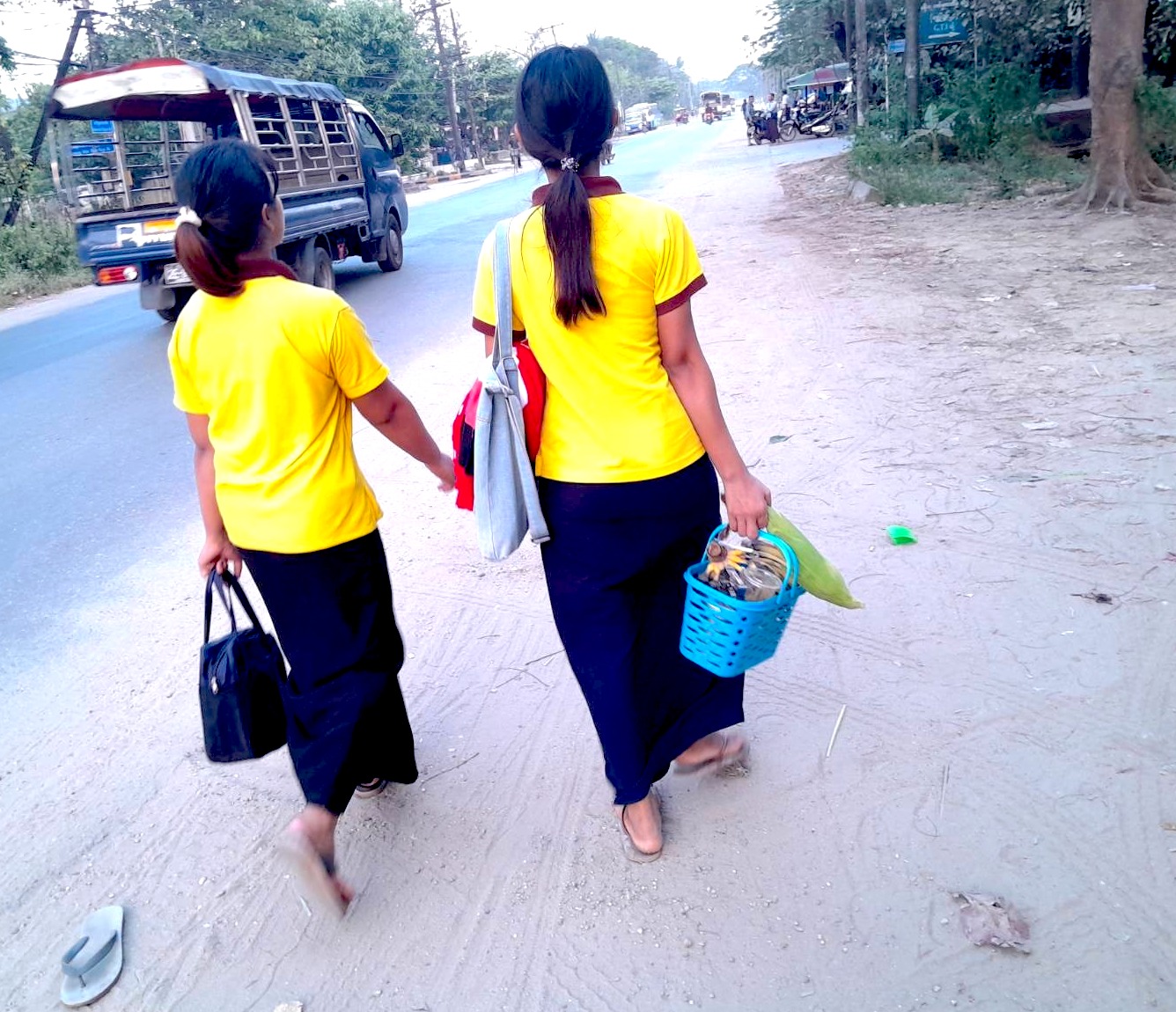
Into the Life of Myanmar Women Factory Workers
As the world’s longest civil war rages on in Myanmar, its citizens are increasingly enslaved by collapsing economic conditions. Long familiar with the tiny gains and vicious crashes brought on by political shocks, workers in Myanmar now face insurmountable hardships as the fourth year post-coup gets underway. Workers are now confronted with life-changing choices. The military’s seizure of power has led to escalating violence, increasing malnutrition and starvation, and rapidly diminishing opportunities. People must now decide either to shelter in place with no end in sight, or face down unknown conditions as migrant workers overseas.
Young garment factory workers share their experiences from Yangon and Samut Prakarn industrial zone, in neighbouring Thailand.
Story and Photos by Josephine Kai & Paw Thu // Edit by Ye Naga & LS
I) Working in Myanmar
24 year-old Myint Zu* considers herself hardworking but cannot accept sleeping at the factory for three nights per week. Refusal is however not an option for workers in this garment factory in Yangon, as they are confronted with increasingly difficult circumstances required by newly-imposed overtime (OT).
After the February 2021 military coup, conditions for factory workers have worsened. With little function to the rule of law, workers are left with no means through which to challenge labour violations. In Shwe Pyi Thar industrial zone many workers are coerced into accepting OT against threats to deductions from their wages.
Myint Zu recalls that “the practice stopped when officials came to check but was then quickly resumed.”
The centre of production in Yangon, Shwe Pyi Thar township likewise quickly found itself at the centre of military targeting, as increasing numbers of factory workers from the area rallied to calls for citizens to join the Nobel Peace Prize-nominated Civil Disobedience Movement. As workers within industrial areas fought grimly for better conditions, the military attacked them with tear gas, live rounds and stun grenades, causing many deaths at the peak of the resistance in March 2021. Since then, Shwe Pyi Thar township has been under the control of martial law.
With the whole of the country subjected to the curfew imposed by the regime, being outside between 8:00pm to 4:00am was prohibited until October 2023. After this, curfew times in Yangon were modified from between 1:00am to 4:00am.
Workers, particularly those doing forced overtime, must somehow navigate the curfew at the end of their working day. With no transport provided for the night shift overtime, workers often have no choice but to spend the night, sleeping on the cold floor, without beds or bedding.
On a good day, Myint Zu finishes her OT at 11.30pm. Some days, however, it can drag on until 3am, leaving her with no choice but to sleep at the factory. In addition to the military-imposed curfew and patrolling soldiers, increasingly desperate economic conditions have seen an uptick of opportunistic robbers and organized gang crimes.
“For males, there is the risk of being caught by patrolling soldiers; but it is dangerous for women on the way in any case,” said Myint Zu explains why the labourers cannot go home at midnight.
The factory has failed to provide shuttle services sleeping spaces for its night-shift overtime workers, so labourers including Myint Zu must sleep at their working tables crowded with sewing machines, or lay down on the cold cement floor. Mosquitoes, and the blood-borne diseases they harness, are an additional issue, as the factory does not permit mosquito nets.
At 7:30am, the morning shift begins. “The next morning, my body is in pain,” said Myint Zu.
Some of her colleagues have fallen ill. Myint Zu is suffering from chronic pain in her legs which is exacerbated by overtime and overnight stays, with limited opportunity to rest.
Garment factory worker Win Win also got sick from the arduous working conditions at the factory, indicating continuous working days with no time off as the reason.
“It’s been too long that I still cannot get rest on Sunday” said Win Win. When she refused to do Sunday overtime, and tried to assert her right to one day off per week, 17% of her salary was deducted at the end of the month.
“I do not dare to refuse overtime again since they deduct that much”.
Workers have prolonged skin contact with the fabric they make clothes from, which causes irritations. Health and safety issues at the workplace have become the most concerning labour rights violation for Myanmar factory workers in 2023, according to the recent report by the local labour union Solidarity of Trade Union Myanmar (STUM). Women workers face open sexual harassment and pressure to meet the production target. Most female factory workers are in the garment industry.
“I can’t get by without taking a shower after work because the pieces of cloth make me unbearably itchy,” explains Myint Zu, asserting that the post-work shower is an absolute necessity for workers like herself, who sew for long hours. However, male workers are also forced to take night shifts, which adds to Myint Zu’s safety concerns, particularly at times when she needs to access the shower facilities.
The Myanmar garment industry supplies clothing to a range of international brands. Despite a significant exodus of these brands from Myanmar in acknowledgement of deteriorating human rights, no substantial change in politics has occurred, and according to a labour rights activist we spoke with, brands are likely to come back for access to the cheap labour force with few protections for workers.
“Although it is difficult for employers to deal with irregular electricity supply and uncertain transportation, the labor cost in Myanmar is very cheap,” said Tin Tun, a local labor activist.
Blackouts in Myanmar are not just common, they are scheduled, with many areas operating up to twelve hours every day without electricity. Those who can afford to do so run petrol-powered generators. With fuel prices on the rise, this is an expensive undertaking, particularly for factories that rely on large amounts of power for production.
The coup has led to less foreign investment and capital outflow, and the Myanmar kyat has steadily devalued whilst the cost of living has skyrocketed.
Workers’ strikes advocating for an increased minimum wage, have resulted in the junta-controlled National Committee for Designating Minimum Wage decision to provide workers with an additional daily stipend of 1000 MMK. With the stipend, workers earning 4,800 MMK (1.55 USD) per day now receive a total of 5,800 MMK (1.87 USD) per day. Announced on October 9, 2023, the stipend comes instead of a direct minimum wage hike, to protect employers from having to pay workers proportional overtime, professional fees, and other benefits.
Even though it has been five years since the last minimum wage increase, the law stipulates a wage analysis every two years. The Ministry of Labor, now controlled by the junta, asserted that the current situation was not conducive to a minimum wage hike. The law, they argued, does not explicitly mandate raising wages every two years but instead emphasizes analyzing them within that time frame.
Myint Zu receives the minimum wage plus stipend – 5,800 kyat daily. This marginal increase is of no meaningful value as rampant inflation has destroyed purchasing power to about half of what it was before the coup, Myint Zu estimates.
A frugal meal for one person and a small pack of sanitary pads can cost up to 1,500 kyat (0.44 USD).
Many of Myint Zu’s friends have left the country to find work overseas, navigating difficult bureaucratic passport processes and financial hardship to do so. Amid loneliness and increasingly dire working conditions, she has also considered leaving, but has been blocked by her father, who cannot bear to see her go.
*Name has been changed
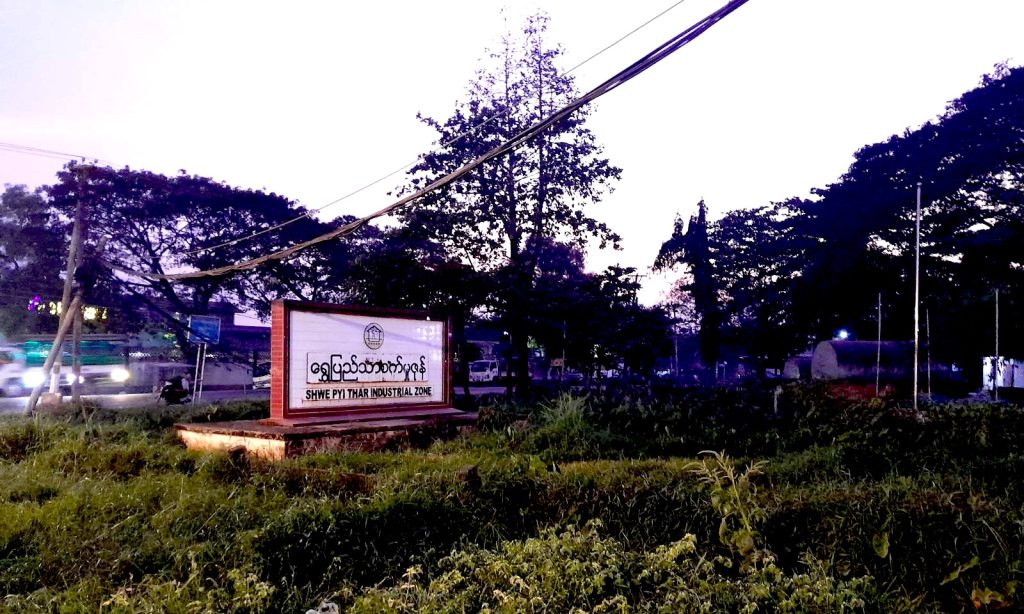
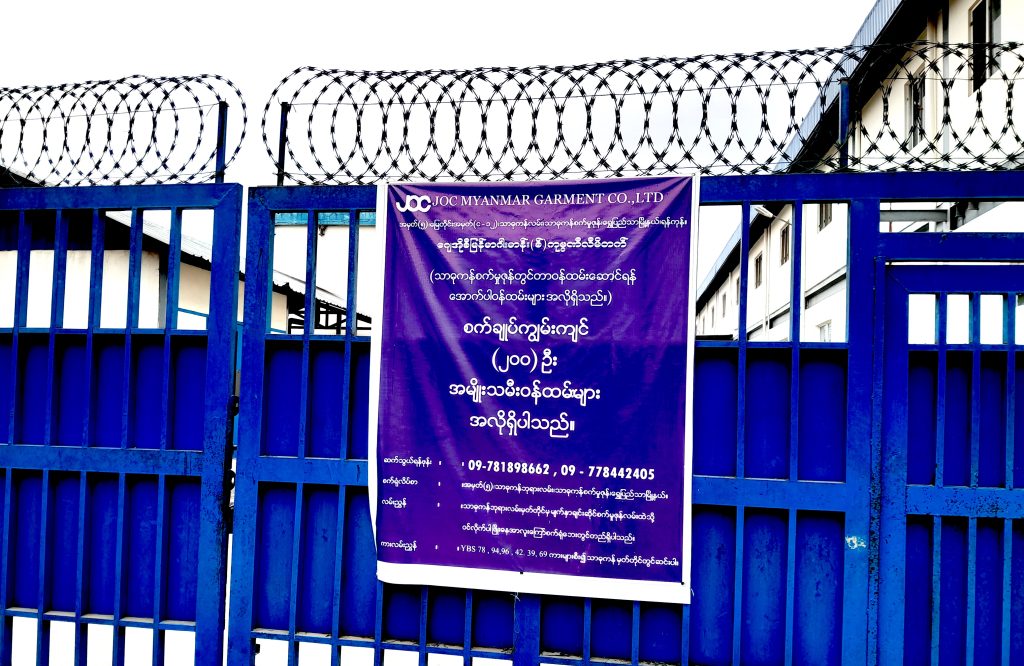
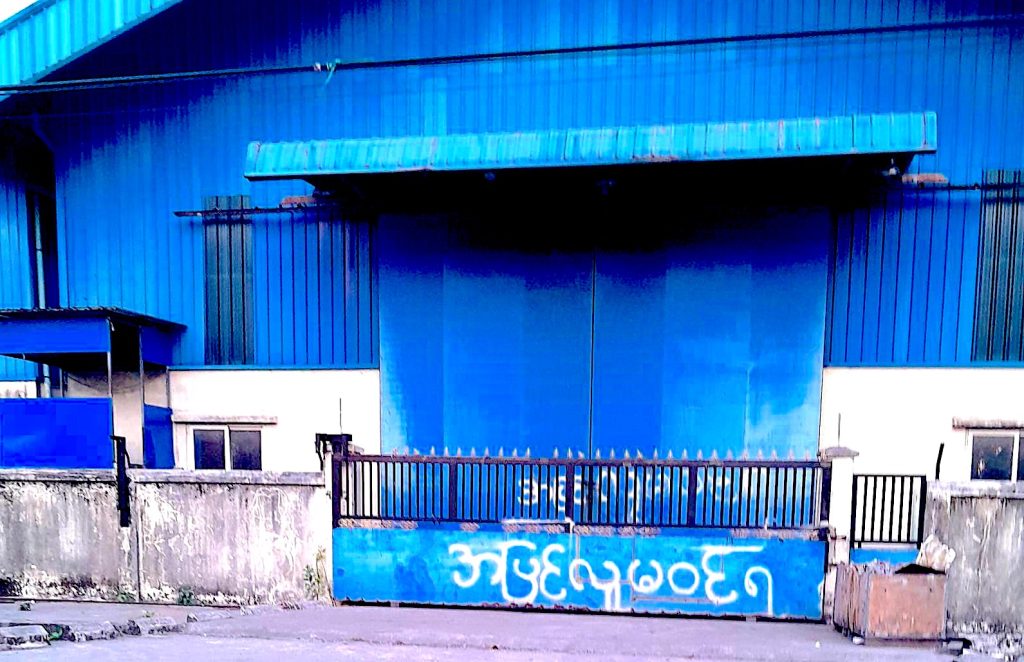
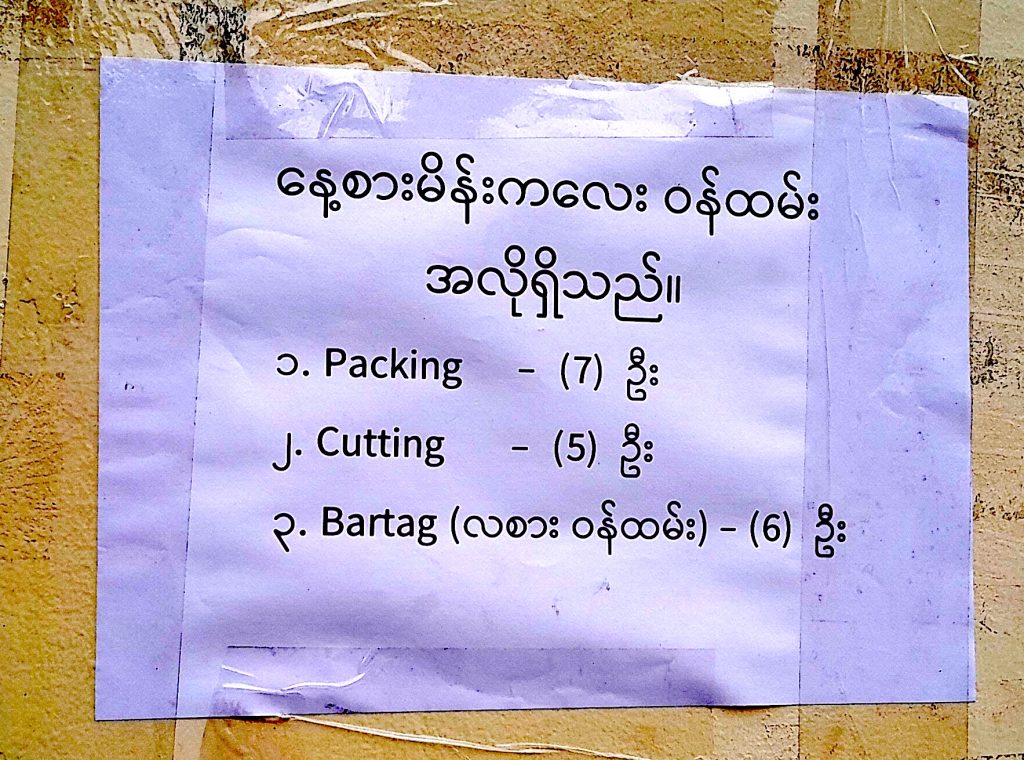
II) Working Overseas
650km away from Yangon, another 24-year-old woman from Myanmar has embarked on a different path. Far from her hometown of Hpa-An in Karen state, Khaing Lay has become a migrant worker in the neighbouring country of Thailand – the ‘better opportunity’ chosen by millions of Myanmar citizens.
Until recently, she worked in a garment factory in Samut Prakan, an industrial town southeast of Bangkok bordering the Gulf of Thailand. Overseas, she made 395 baht daily (11 USD) – 6.8 times more than the minimum wage today in Myanmar. She believes it is a reasonable income considering the living cost.
A frugal meal in Thailand costs 40 baht (1.12 USD) and a small pack of sanitary pads is 20 baht (0.56 USD).
But the migrant life is not easy.
In May 2023, Khaing Lay and her eleven colleagues were laid off. The garment factory claimed that their work permits and passports had expired so they could not continue to work at the factory.
It was true that their documents would expire very soon but it was not grounds for dismissal. Migrant workers can return to Myanmar to renew their documents or register in the exemption programs offered by the Thai government. Living in Thailand, legal status has become the major concern for migrants from Myanmar.
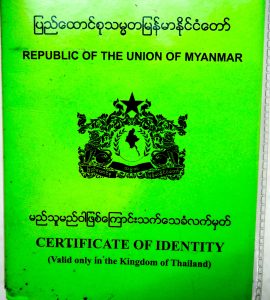
The factory bosses failed to inform Khaing Lay and the other workers that their two-year contracts would not be extended. This was contrary to what the workers had been told. The Burmese translator in the factory indicated that the contracts had been extended, and that the factory would take care of the document renewal process as before.
“We cannot renew these documents without the assistance of the factory officials” said War War*, one of the women workers laid off with Khaing Lay. Migrant workers require recommendations from their employers in order to extend their work permits.
Migrants need an employer to gain a work permit. If a worker is fired, continuing to hold an active work permit can assist with finding a job legally.
When Khaing Lay and colleagues were fired, their work permits also expired. They were caught off guard, and had not sought new employers to extend their permits based on the false information they had from the factory regarding their job security.
The garment factory was ordered by the Labour Protection and Welfare Office to compensate the workers. It is unclear why they dismissed Khaing Lay and her colleagues but one of the reasons could be that the garment industry in Thailand is in a downward trend due to the cheaper workforce in the region, such as in Vietnam, Cambodia and Bangladesh.
Most garment factory workers are women because it does not require intensive heavy labour or a high education. In the past few years, many garment factories in Thailand have run out of business, ending careers for many women workers, both Thai and non-Thai.
Khaing Lay spent 5 months looking for a new job in a competitive job market. Despite having migrated to Thailand before the recent political shock, the coup’s negative effects had reached the migrants in Thailand. In December 2023, the Myanmar embassy in Bangkok announced that it would only renew passports for workers who pay 2% of their income as tax – a new money-grabbing policy imposed by the increasingly stretched military in countries where many Myanmar migrants live such as Thailand, Singapore and Japan.
Khaing Lay has mixed feelings about her decision to be in a foreign country. It is not financially wise to be at home in Myanmar with the rising living costs, and she enjoys the stability, safety and independence of Thailand. But she misses her one-year-old baby who is living with her parents-in-law in Myanmar.
“My grandfather was disappointed when I left home at 15, but actually, I came here as I wished,” said Khaing Lay. “Despite everything, I want to go back someday and raise my kid in a Myanmar school.”
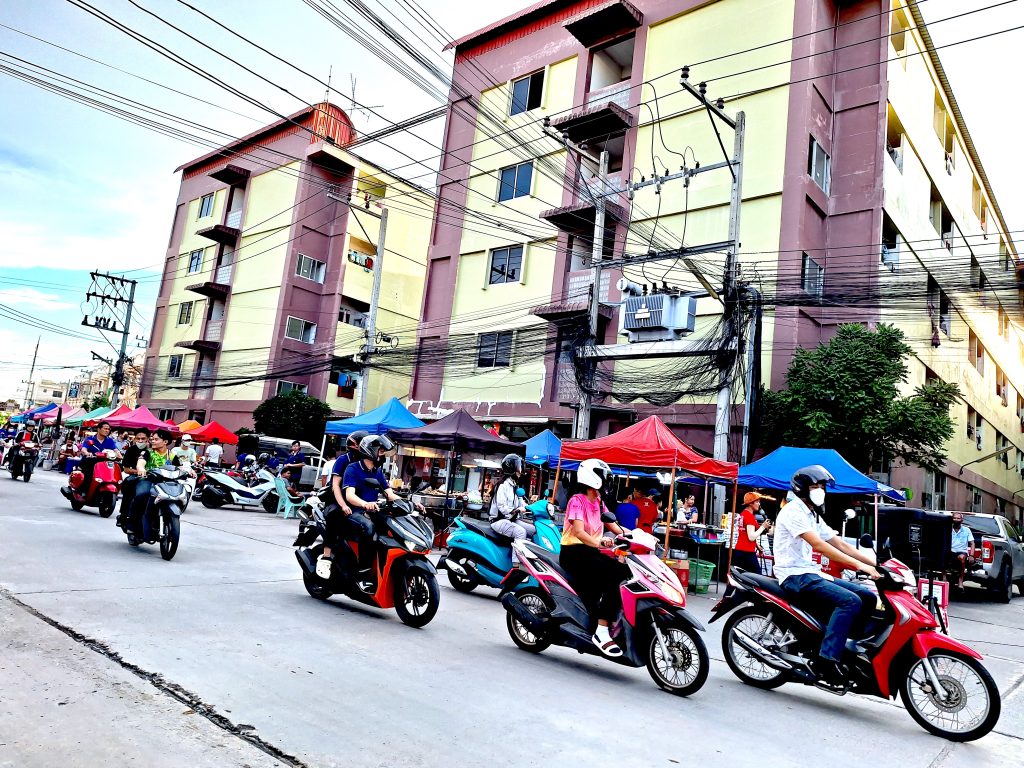
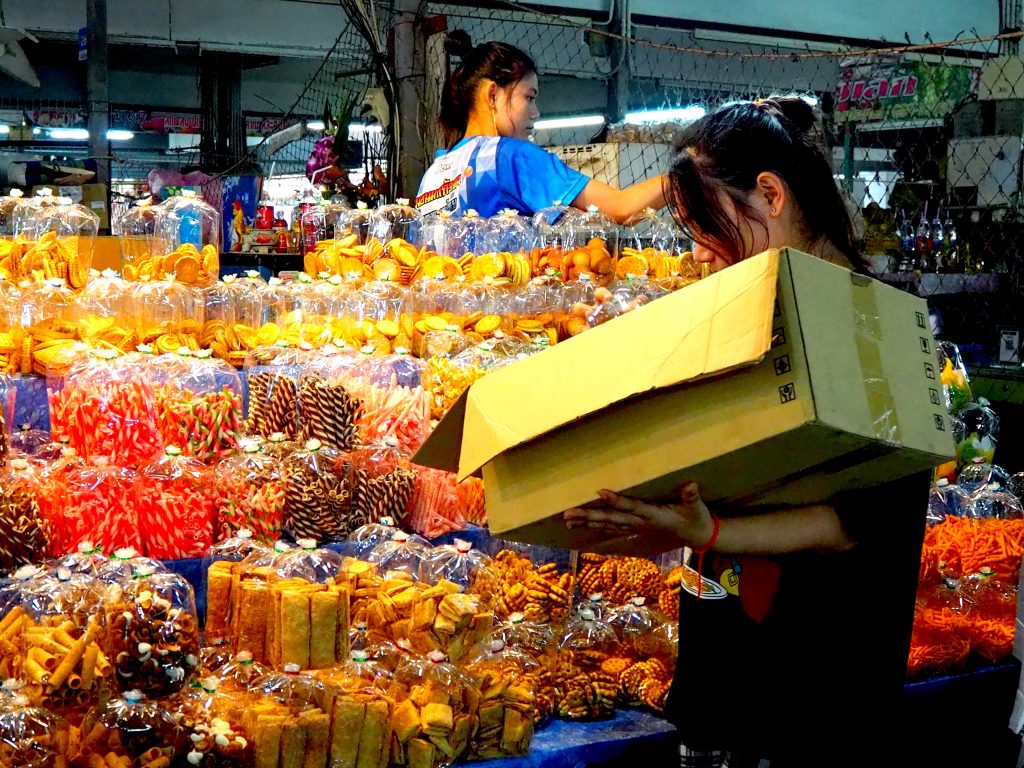
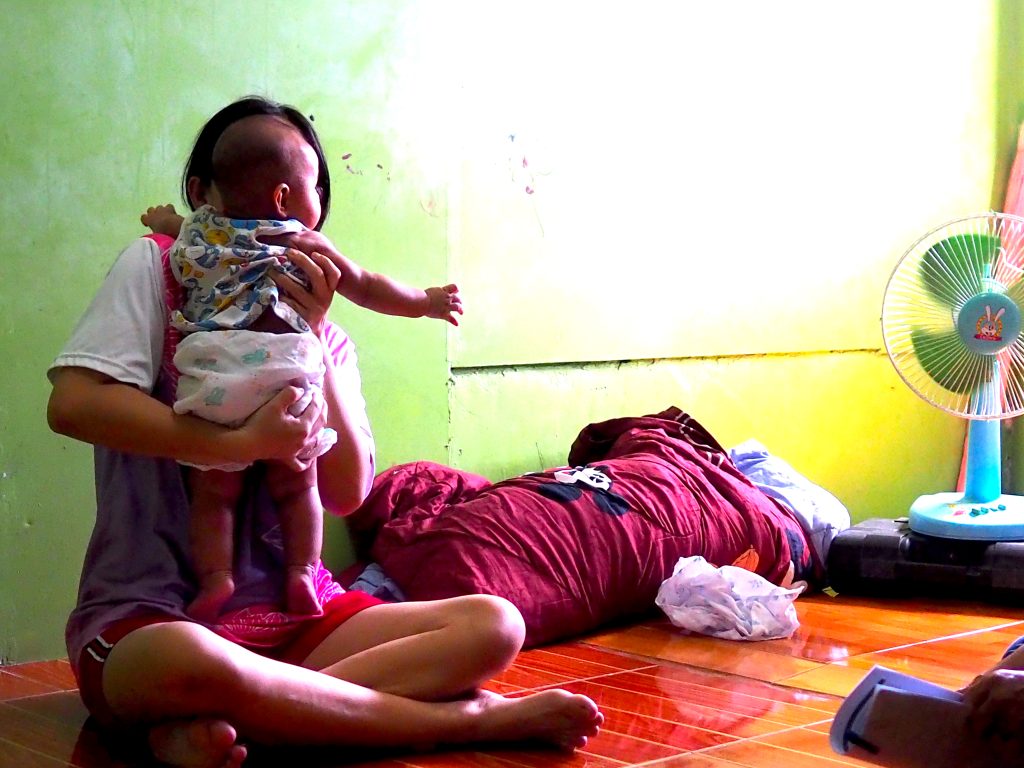
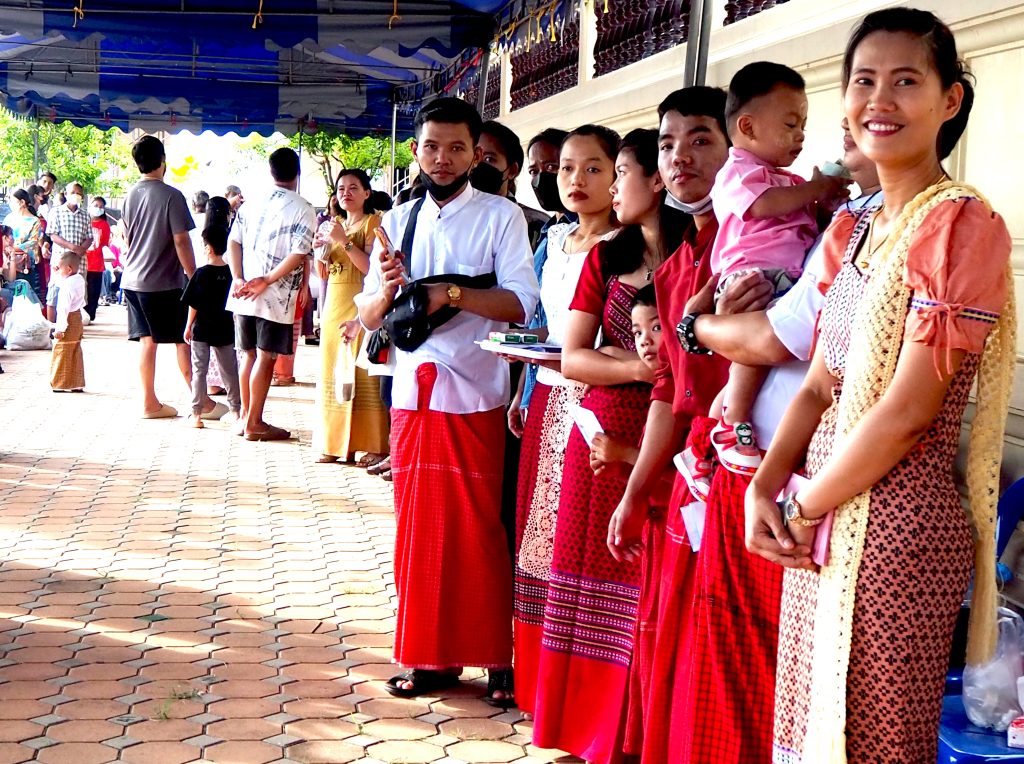
III) Defending Their Rights
Struggling against the effects of the flagging economy, factory workers in Myanmar have little space to defend their rights. After the coup, any kind of protest, whistleblowing or collaboration with the labour union put them at risk of being targeted by the military.
In Yangon, Myint Zu found herself and her colleagues facing several forms of violations. “Supervisors sometimes hit the back and hands or knock on the heads of the workers. But they try to leave no wound to trace.”
Similar testimonials are emerging from other garment factories. San Nwe was forced to sign a resignation letter in December 2023 for speaking up against the line manager who insulted her colleague. With help from a labour activist who ran the issue at the local labour office she was later reinstated, but there has been no punishment for the manager nor any promise of a working environment free from humiliation.
In Thailand, speaking out on labour violations in factories is easier. Even though migrant workers cannot establish their labour union, they can join the unions led by Thai workers. Thanks to the help of the Workers Union of Spinning & Weaving Industries of Thailand, Khaing Lay received 71,100 baht (1,994 USD) compensation from the factory for her unfair dismissal. She also received financial support under social security during her unemployment.
In 2023 the Freedom Fund gave Myanmar a score of 9/100 for freedom in political rights and civil liberties, while Thailand was granted a 30/100.
From the labour rights activist’s observation, women workers would prefer to stay in Myanmar if the economy was better. But with the current situation, options are limited.
“Many people cannot afford the cost of being migrant workers in a better country, “said Daw Myo Myo Aye, a member of a labour union based in Myanmar.
“Those who stay in Myanmar keep staying with the hope that their wages will increase and every other thing will be better.”
At this stage, all signs indicate otherwise.
IV) Escaping Forced Conscription
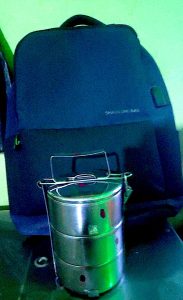
The February 9th military announcement of forced conscription to begin in April has triggered mass panic among those who remain in Myanmar. According to the law, male citizens between 18 and 35 years of age and female citizens between 18 and 35 years of age (18-27 for unmarried women) must serve in the military for a minimum of two years. Specialists such as doctors and engineers up to age 45 must serve for three years. Evading conscription is punishable by three to five years in prison and a fine. Junta spokesperson Zaw Min Tun said about 13 million young people would be eligible for conscription, with 60,000 men the first to be recruited and trained reportedly beginning with a first batch mid-April, after the Thingyan festival. The military targets 5000 people per month and women will be in the 5th batch of training. Workers and students living in foreign countries will also need to return and serve in military service.
The junta’s surprise announcement that it’s seeking to boost its armed forces with compulsory service prompted a rush by young people to get visas out of the country. Videos shared on social media show long queues of people clutching documents at the Thai Embassy in Myanmar’s biggest city Yangon, and hundreds of people were recently detained by suspicious junta authorities after their flights arrived in Rakhine state from Yangon. Forced recruitment of soldiers in Yangon, Mandalay, Sagaing and Ayarwaddy regions as well as ethnic areas is already taking place, and cases of kidnapping and disappearance have risen exponentially across the country
On February 20th at 2 am, two women – Khin Myo Aye, 52, and Khaing Wai, 39 – were caught in a crowded pre-dawn queue at the government passports office in Mandalay. They died of suffocation as several thousand people who hope to leave the country crammed together inside a fenced-in area. A third person, Htay Htay Win, 53, was being treated for a leg injury at Mandalay Public Hospital.
Adding to the confusion, junta spokesperson seems to imply in a February 21st announcement that women wouldn’t be serving in priority as it would have an impact on the “productivity” of the female-dominated textile industry. “Men in the frontline, women in the factories” is a national survival strategy that was followed by European countries during the two World War.
A young woman in Thandwe, southern Rakhine state, says that after months of trying, she finally got an appointment via a QR code for a passport application, but only for August 22nd. “Due to the political situation, all my avenues for opportunities have disappeared. It’s getting very strict here day by day. I don’t know what to do”

The production of this story was supported by the Asia Pacific Forum on Women, Law and Development (APWLD) Media and Visual Journalism Fellowship on Militarism, Peace and Women’s Human Rights.
You can read a version in Burmese (Burma Associated Press) and in Thai (Prachatai).
Our previous related stories:
- A Month of Unity for Thai and Burmese Workers (May 2022)
- One River, One Border, Two Realities (October 2022)
- Myanmar Youth Seeks Japan as a Work and Study Eldorado (January 2023)
- Workers Demand Rights for All in Thailand (May 2023)
- Thai and Myanmar Residents Hope for a Common Fair Future (May 2023)
- Myanmar migrant workers in Thailand not invited to first social security board election (December 2023)